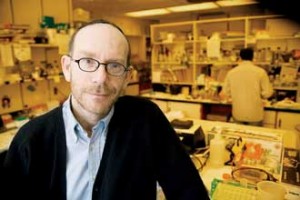
Szyf lab benefits from GlaxoSmithKline, CIHR partnership
By McGill Reporter Staff
A new professorship in Pharmacology will allow McGill professor Moshe Szyf to continue groundbreaking work in epigenetics – research that may provide science with a better understanding of, and lead to better treatments for, diseases such as cancer.
On May 13, Szyf, professor in the Faculty of Medicine’s Department of Pharmacology and Therapeutics, was awarded the inaugural GlaxoSmithKline-CIHR Professorship in Pharmacology at McGill University, funded by GlaxoSmithKline Inc. (GSK) and the Canadian Institutes of Health Research (CIHR). The Professorship has received funding in the amount of $1.3 million.
“This announcement underscores the wonderful impetus created through partnerships among granting agencies, private enterprise and academia to advance research and lead the way in the development of new treatments and cures,” Richard Levin, Vice-Principal (Health Affairs) and Dean of the Faculty of Medicine, said. “We are thrilled that Professor Szyf, one of our top scientists, has been chosen to lead the GlaxoSmithKline-CIHR Professorship and to advance our knowledge in this critical area of study.”
Epigenetics explores heritable changes in gene function that occur without a change in the DNA sequence and which contribute to the development of diseases. A world leader in epigenetics, Szyf has focused his research on understanding the basic principles of DNA methylation machinery and its involvement in cancer. He has applyied this research in identifying novel anticancer targets.
“Science cannot be managed or programmed, nor defined by committees; it comes out of unhindered thinking of curious and free minds,” Szyf said. “The GlaxoSmithKline-CIHR Professorship provides us with this freedom to think dangerously. My main challenge is to utilize the opportunity provided by this generous gift to think the unthinkable and to continue bridging the social environment and our physical DNA – a bridge that is critical for health as well as well as for our social and physical being. To understand human health and disease, we must study humans in their true environmental context.”
Szyf’s laboratory focuses on how the social environment during early childhood affects the way genes are marked and the machinery that lays down these marks, as well as on developing drugs that act on this machinery as anticancer agents. He made headlines earlier this year with a research paper published in Nature Neuroscience on how early negative life experiences affect people’s genes. This work, undertaken with Professor Michael Meaney of McGill’s Departments of Psychiatry and Neurology and Neurosurgery, and Gustavo Turecki, Director of the McGill Group for Suicide Studies at the Douglas Institute’s Departments of Psychiatry, Human Genetics, and Neurology & Neurosurgery, further proved the influence of the environment on DNA.
